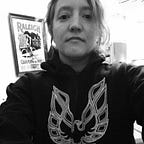Curtain Weights
1.
There are these small metal disks you can sew into the hems of drapes to keep them hanging neatly. (Or you can make your own with paper clips and pennies.) Dress weights exist as well, to keep your skirt from flying up, and apparently the Queen of England thought Kate Middleton should make use of them. One too many royal wardrobe snafus, I guess. Because I think we exist most like swathes of fabric comprised of many interwoven threads, I wonder if we could also hold ourselves in place with series of carefully placed weights. Here I’m referring to ‘place’ as a comforting space, to ‘weights’ as a series of signposts, of markers of identity. Identity seems to be a touch word in poetry, some people avoiding it, others embracing it. Where are you? Where am I? All I know is, I don’t shed myself when I write.
2.
Expectations can also be weights. The knowledge that when I/you write about or from the place of one’s own dis/ability or neurodivergence, I/you may be writing into a place where one’s own narrative (or lyric) might be held up as representational of a larger group. Really, from my own experience I could say, I am just writing from my life (from, not necessarily about, there’s a difference), which is often far more ho-hum and anti-cathartic than many of the narratives I see written about mental illness (for example) by friends or family members of the mentally ill. By ho-hum I don’t mean mire, muck (not at all!), but rather daily joy, daily struggle, daily in-between, dailyness itself.
3.
I’m reading a lot right now. Sometimes I receive books in the mail that have made their way over the Atlantic to my home in Germany. At the moment, I’m loving Kate Schapira’s Handbook For Hands That Alter As We Hold Them Out (Horse Less Press). In “Amnesty of Love,” she writes: “I still say ‘I.’ All the time.” A few lines down: “All my strings then taken in / a handful by love, predictably.” The last line of the poem: “I owe myself everything.” This speaks to me right now, right here and now, in so many ways that I cannot enumerate those ways. But I will say: here we all are, sitting in rooms full of I’s, dusting off words, which are the components of ideas. I’m reading Beauty Is A Verb: The New Poetry of Disability (an ALA Notable Book of 2012), edited by Jennifer Bartlett, Sheila Black, and Michael Northen. I’m also thinking about disability in our current lexicon of 2016, of how it has become an umbrella term to include physical disability, psychiatric disability, and chronic illness, and about commonality and difference and about intersectionality within disability itself. I’m thinking about subjectivity and weird, impossible objectivity, and in that vein scrolling through Lyric Shame: The “Lyric” Subject of Contemporary American Poetry by Gillian White. I’ve just started, but from the description the author will be discussing the lyric as “a way to project subjectivity onto poems.” I’m thinking about the clearest, most brilliant, most confusing thing I’ve ever read about the I in contemporary poetry, written by Claudia Rankine in her essay, “The First Person in the Twenty-First Century” (published in After Confession: Poetry as Autobiography, edited by Kate Sontag and David Graham). Rankine writes: “Am I not the life and death of my I’s assertion? Does not my every word, on its way to a sentence, gather together my being, my presence, in order to lose it?” Yes. Yes. Finally, I’m tearing through Tiny Beautiful Things, a collection of Cheryl Strayed’s Dear Sugar columns from The Rumpus. I found this book about a month or two ago in a cardboard box at a used book stall on my way home from the bank and stowed the orange volume on a shelf. I picked it up last night and weirdly, wonderfully, reading the empathy on those pages is curing my writer’s block. I’m thinking about things I have to say, about knowledge I have to gain, about how say can also be a weight.
4.
So. Here I am. Back to weight. Weight, like a curtain weight, is matter and holds matter in place. But I don’t feel heavy until I think about expectations. (Whose expectations? I’m not always sure. My own? My community’s? Those of a more general readership? Some combination of all three?) I feel heavy when I think about writing as a representative of identity instead of from identity. Again, there’s a distinction. Who I am, who a lot of us are, is light, energy. We are bodies existing in space. We are living our lives, for ourselves and for our loved ones. I’m drawn to what John Lee Clark, a DeafBlind poet, remarked about Deaf poetry in “Disability and Poetry: An Exchange” (originally published in Poetry in December 2014): “For example, ‘visual music’ and ‘ASL is beautiful’ are the two most common tropes in Deaf poetry, working to counter audist notions of deafness and muteness; meanwhile, in real life, Deaf people are busy cooking, videochatting, texting, dating, raising families, and making transactions, not all of them legal. I realized that I needed to write beyond these arguments, not to leave behind our causes or obscure my identity, but to claim more and more space in which we can just be.” To claim more and more space in which we can just be. There you have it, I suppose. So, here’s to being.
5.
(Stay tuned for more on this subject.)
Jenny Drai’s column for Drunken Boat appears on the first Thursday of every month, exclusively on Medium.
